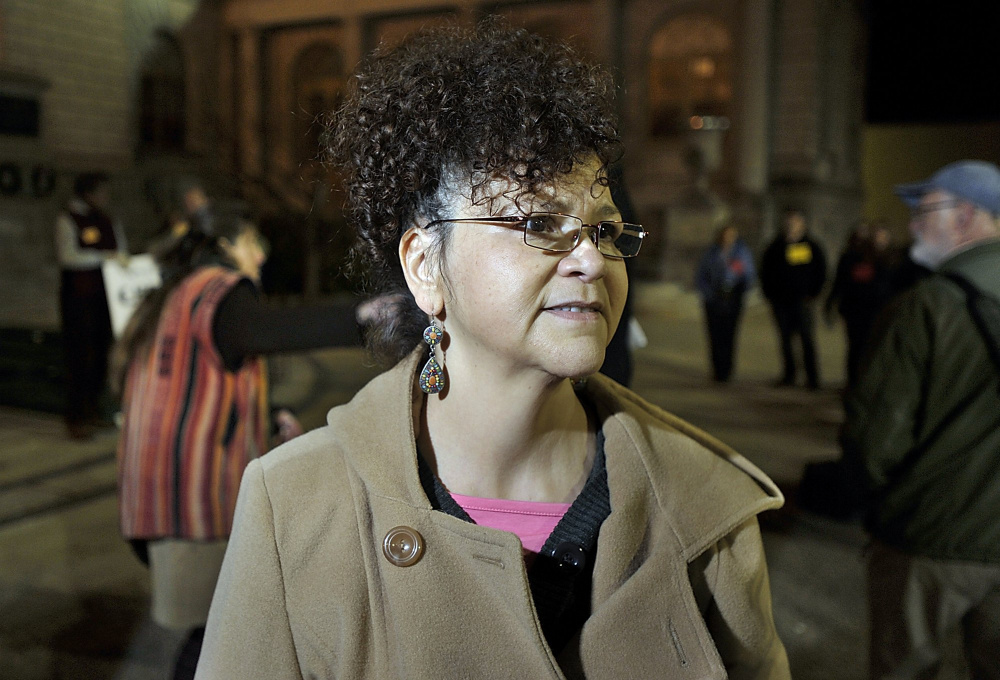Portland’s city attorney is warning city councilors that adopting ordinances to protect renters – whether through rent control or restricting mass evictions – could be fraught with legal and logistical challenges.
To avoid heading down a potentially “very costly and time-consuming” path, the city should focus its energies on changing state statutes that regulate no-cause evictions and housing vouchers, said City Attorney Danielle West-Chuhta. No-cause evictions, which are allowed in cases where tenants do not have leases or when leases expire, have been used by some Portland landlords to clear out buildings and make way for renovations and increased rents.
“Evictions are a contentious and divisive issue,” West-Chuhta said in a memo to the City Council’s Housing Committee. “As it now stands, the Legislature and the court system are the primary parties dealing with this stressful issue.”
West-Chuhta said the city has the legal ability to adopt local rent control, but it would be an almost unprecedented step in Maine.
Her memo could discourage officials from adopting many of the local protections called for by tenant advocates amid a severe shortage of rental housing that has led to rapidly rising rents and some mass no-cause evictions. The committee will meet Wednesday to review the memo.
Committee Chairwoman Jill Duson and Mayor Ethan Strimling could not be reached for comment Monday afternoon.
Councilor David Brenerman, vice chairman of the committee, said councilors are more likely to push for a longer notice before evictions than to support caps on rent increases.
“I would guess that most councilors are not enamored with the idea of rent control,” he said. “I don’t see much support for it at this time.”
However, advocates for Portland renters, including Pine Tree Legal Assistance, Preble Street’s Homeless Voices for Justice and the Portland Tenants Union, seized on the fact that the city’s attorney did not expressly rule out any options.
“We believe there are ways that the ordinances can be structured to enable the city to accomplish the goals of stabilizing housing for low-income people and ending discrimination,” said Katie McGovern, a lawyer at Pine Tree Legal, which helps low-income people. “Corporation counsel recommends state legislation, but the city has the opportunity to make a significant difference for a large number of people through its ordinances modifying the landlord-tenant relationship in the city.”
Dee Clarke, an advocate for Homeless Voices for Justice, said a diverse city would do something to protect renters.
“The city has an obligation if they’re saying they want to be a diverse city. Otherwise they’re not and it’s a classist city,” Clarke said. “Right now, the city is allowing the rents to go skyrocketing up to a point where people can’t afford them and we’re going to get pushed out.”
After decades of stagnant housing growth, Portland has been experiencing a development boom of market rate and luxury housing units. As demand for high-quality housing remains strong, local landlords are selling their buildings or upgrading the units in order to attract higher rents. In some cases, that has resulted in displacement of low-income tenants, while making the city unaffordable to those working in the service industry.
A Portland Press Herald investigation of the city’s rental market found that, as of last fall, rents in Portland had increased 40 percent in five years.
Late last year, Strimling appointed a special housing committee to address the issue. The panel consists of five councilors, two more than a typical committee. The panel has been conducting public hearings to collect information and suggestions about ways to ease the housing crunch.
West-Chuhta’s memo marks a new phase for the committee, which is now winnowing a multitude of possible remedies with an eye toward recommending specific policies to the council. Her memo addresses remedies suggested by the Portland Coalition for Housing Justice, such as rent control, restricting no-cause evictions, and prohibiting discrimination against people with housing vouchers.
Of those three remedies, West-Chuhta said rent control is perhaps the most viable. The Maine Legislature passed a law specifically allowing municipalities to establish rent control in 1973, as long as a city or town followed a specific process. The law was repealed in 1995, leaving rent control solely to a municipality.
The city of Westbrook adopted rent control in 1990 and is the only community to have such an ordinance, according to the memo. Westbrook’s ordinance applied only to mobile home parks, however. It required property owners to meet with a committee of residents whenever a rent increase or decrease in services was proposed. If the increase was unreasonable, the residents could file a complaint with the city, triggering a review by the city’s Rent Justification Board. That occurred in 1998, and the board denied the park owner’s suggested rent increase on 288 sites.
It’s unclear whether the owner appealed to the state courts, or whether the review board still exists. Westbrook City Administrator Jerre Bryant didn’t respond to requests for comment.
Portland, meanwhile, had a vigorous debate about rent control in 2001-02. Like today, vacancy rates were less than 1 percent, driving up rents and displacing low-income tenants. But the council turned down a proposal to freeze rent increases over a five-year period.
Brit Vitalius, president of the Southern Maine Landlord Association, said the city should wait to see how an influx of hundreds of housing units affects market rents before adding regulations.
“The market is starting to respond. I get more concerned we’re going to get overbuilt and slide back down the other way,” Vitalius said. “If the issue is that the rents are too high, you can’t control that unless you go to rent control. (And) I don’t think Portland has the appetite for rent control right now.”
West-Chuhta said the city was limited in how it could regulate no-cause evictions, which can occur with 30 days’ notice when a tenant does not have a lease. No-cause evictions are allowed under state law, so the city probably can’t ban them, she said. The city could increase the notice period beyond 30 days, but the means of enforcing the requirement would be through a civil summons that the city would have to enforce.
The Portland Tenants Union will continue to push for a moratorium on no-cause evictions, even though West-Chuhta said such a moratorium would be “even more problematic than the advanced notice requirement.” The group also will keep pursuing rent control, said union member Maria Anderson.
“Our stance is that the city needs to take action on those ASAP,” said Anderson, a 29-year-old Lutheran pastor. “They are affecting all renters, and especially low-income renters right now.”
Send questions/comments to the editors.





Success. Please wait for the page to reload. If the page does not reload within 5 seconds, please refresh the page.
Enter your email and password to access comments.
Hi, to comment on stories you must . This profile is in addition to your subscription and website login.
Already have a commenting profile? .
Invalid username/password.
Please check your email to confirm and complete your registration.
Only subscribers are eligible to post comments. Please subscribe or login first for digital access. Here’s why.
Use the form below to reset your password. When you've submitted your account email, we will send an email with a reset code.